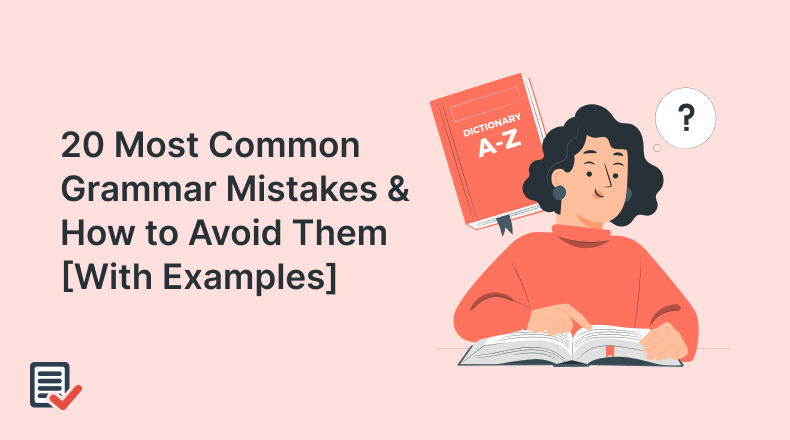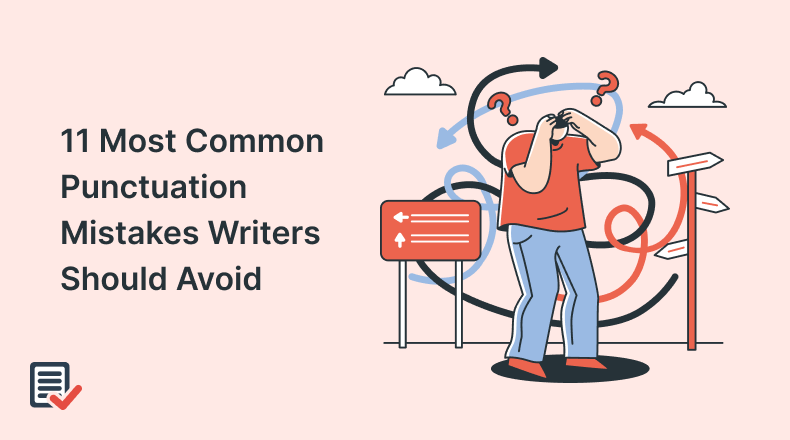
When writing, even a minor mistake can create a big mess. As you write something, you must aim to communicate your message clearly, and if your audience struggles to follow along, your efforts may be wasted.
Therefore, whether you’re drafting emails, writing reports, or creating content, your written text must be clear or readable, there is no grammatical error. Otherwise, these errors can mistakes can disrupt your writing’s flow, so you should avoid them.
In this guide, we’ll explore 20 common grammar mistakes that most of us often make. Let’s dive into these common mistakes and their prevention solutions!
Most Common Grammar Mistakes
1. Misplaced Commas
The comma is an essential element anyone who has ever written knows. Unfortunately, few writers seem to understand their proper use. They either forget when to use a comma or where it is not necessary.
Mistake: The dog, ran across the yard.
Correction: The dog ran across the yard.
2. Pronoun-Antecedent Agreement
This agreement refers to the rule that a pronoun must agree with its antecedent in number and gender. When the pronoun does not correctly match the referring noun, this can lead to grammatical inaccuracy.
Mistake: Everyone should bring their book.
Correction: Everyone should bring his or her book.
3. Passive Voice
Passive voice is more effective at expressing an idea sometimes, especially when the action performer of a sentence is vague or general, unknown, or should get a lesser amount of attention than the recipient, such as in specific formal, professional, and legal contexts. Here is the example.
Passive: Jack is rumoured to be alive.
Active: People rumour Jack is to be alive.
4. Subject-Verb Agreement
Subject-verb agreement refers to connecting a sentence’s subject with its verb. A subject relates to a person or something acting as a sentence. And, such action is considered a verb.
This agreement shows that if you have a plural subject, you must have a plural verb; the same goes for singular terms. This error occurs mostly when we use one term as singular or another as plural; the subject is singular while the verb is plural.
Mistake: The dogs barks loudly.
Correction: The dogs bark loudly.
5. Run-On Sentences
Run-on sentences occur when two or more independent clauses join without connecting words. This mistake can make your writing unclear and challenging to follow. The following example will help you understand the proper use of run-on sentences.
Mistake: She loves to write, it makes her happy.
Correction: She loves to write because it makes her happy.
6. Incorrect Use of Homophones
Homophones sound the same but have different meanings and spellings. People mostly confuse these words with each other, as we use the wrong terms in our writing without understanding their Meaning.
Mistake: Your going to love this movie
Correction: You’re going to love this movie.
7. Who vs. Whom
What’s the difference between who and whom? “Who” is a subjective pronoun. “Whom” is an objective pronoun. That simply means that “who” is always subject to a verb, and “whom” is constantly working as an object in a sentence. These two words cause a lot of confusion, even for native-English speakers.
Mistake: Who did you give the book to?
Correction: Whom did you give the book to?
8. Too vs To
To vs. too can be a common mix-up while writing. These two terms are identically pronounced but indicate different parts of speech and even have distinct meanings. There’s an easy way to determine which one is appropriate. “To” is a preposition, while “too” is an adverb.
Too: I want to see the beach and the mountains too.
To: I want to go to the store.
9. There, Their, They’re
In English, they’re is the verb form, their is the possessive adjective, and there is the place indicator. These three terms sound the same, but it’s common to make mistakes and mix up these terms. The best way to understand the proper use of these terms is to remember their rules. Therefore, you can use them correctly without any confusion.
Mistake: There going to their house.
Correction: They’re going to their house.
10. End a Sentence in a Preposition
A preposition indicates that another word will follow, so using a preposition at a sentence’s end automatically sounds awkward or unnatural.
Mistake: Which dress did you decide to go to the party in?
Correction: In which dress did you decide to go to the party?
11. Sentence Fragment
People often write incomplete sentences. While sentence fragments are technically grammatically incorrect, they are acceptable when texting. Still, in academic or professional writing, you need to give your reader a clear pathway and flow of writing.
Mistake: Going to school Tomorrow.
Correction: I’m going to school Tomorrow.
12. Misplaced or Dangling Modifiers
Modifiers are words or phrases placed next to the word they modify. If they aren’t placed, the sentence might become unclear or unstructured.
Mistake: Driving through the park, the flowers were beautiful.
Correction: Driving through the park, I saw beautiful flowers.
13. Incorrect Use of Apostrophes
This grammar element is used to show possession or to form contractions. We mostly make mistakes such as using apostrophes in plurals or forgetting them in possessives.
Mistake: The cats bowl is empty.
Correction: The cat’s bowl is empty.
14. Confusion between Adjectives and Adverbs
Adjectives describe nouns, while adverbs describe verbs. We mostly confuse them as we use adjectives instead of adverbs, and the same goes for adverbs – adjectives.
Mistake: She sings beautiful.
Correction: She sings beautifully.
15. Verb Tenses Shuffling
Maintaining proper consistency in verb tense within a sentence or passage is essential. This shuffling creates confusion when a writer changes from one tense to another without reason.
Mistake: She is going to the store and bought some groceries.
Correction: She went to the store and bought some groceries.
16. Double Negatives
A double negative occurs when two negative words are used in the same sentence, canceling each other and creating confusion.
Mistake: I don’t have no money.
Correction: I don’t have money.
17. Incorrect Comparisons
Comparative and superlative adjectives are used to compare two or more things. When we misuse them, this error changes the whole Meaning of your sentence.
Mistake: She is the most taller of the two sisters.
Correction: She is taller than her two sisters.
18. Incorrect Word Order
When word misplacement occurs in a sentence, it changes your sentence structure or the intent you want to provide your reader.
Mistake: Only I ate the cake. (Implies no one else did)
Correction: I ate the cake only. (Clarifies what was eaten)
19. Capitalization Errors
Proper nouns, the beginning of sentences, and essential titles all these terms should be capitalized, but errors occur when random words are unnecessarily capitalized.
Mistake: We visited The city of Paris.
Correction: We visited the city of Paris.
20. Wordiness
As a general rule, don’t use walls of words to say a little. If you can properly explain something in a few words, why inflate your sentence with extra words? It can confuse the Meaning of your sentence, so the main message isn’t accurately conveyed.
Mistake: A little bit of rain falling from the sky is necessary for plants and flowers to grow.
Correction: Rainfall is necessary for plants and flowers to grow.
Conclusion:
If your reader cannot properly engage with your writing, then what’s the purpose of that written text? In writing, we often make the mistakes that make our entire write-up look unprofessional and difficult to read.
So, it’s better to be aware of such grammar errors and find solutions to avoid them. Using a grammar checker will also help you learn about common writing mistakes and avoid them. That’s why we’ve highlighted such mistakes in this post, along with the examples. Hope this guide will help you improve your writing and make it more engaging for the readers.
Search
Categories
Recent Blogs
-

Avoid Plagiarism in Academics - Useful Tips and Advice For Students
-

How to Write an Executive Summary That Stands Out?
-

What are Periods (.) in Punctuation: Examples & Usage Tips
-

Grammar Vs Syntax - Understanding the Key Differences With Examples
-

What is Editorial Content & How Is It Used in Marketing?

